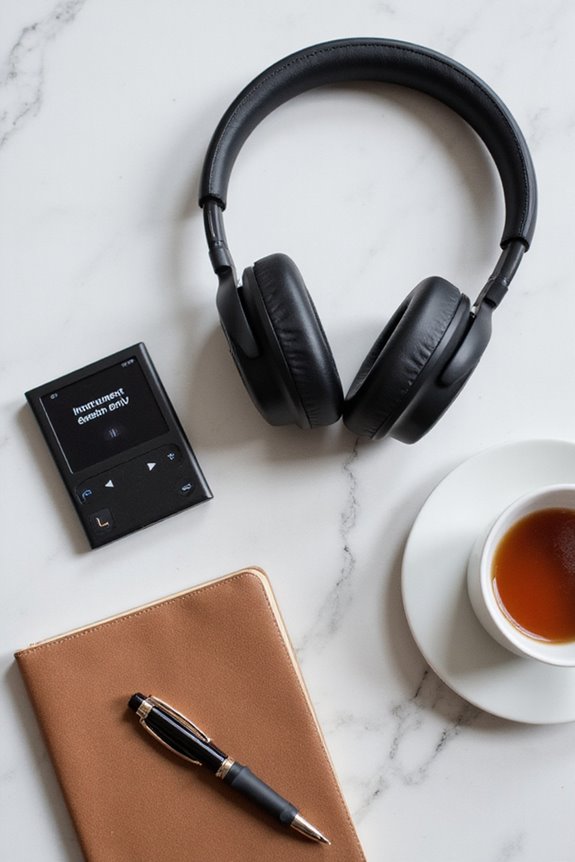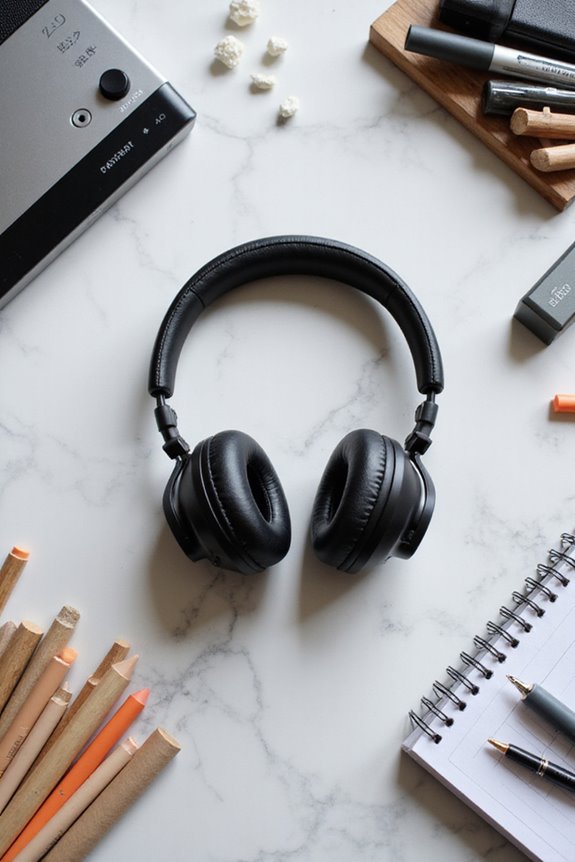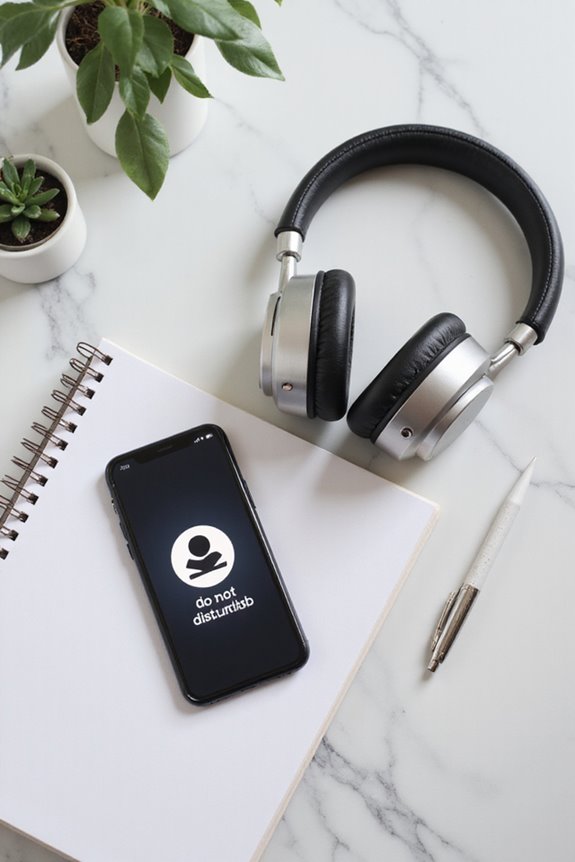To avoid distractions with digital music, let’s choose our tunes wisely. Instrumental tracks are usually best, as lyrics can trip us up. Setting up consistent playlists keeps us from wasting time searching for the next song. Plus, sticking to a steady volume helps maintain focus—avoid sudden changes! Don’t forget to explore recommendations on platforms like Spotify or Apple Music to discover new favorites. By refining our music choices, we can boost productivity and perhaps reveal better focus too. Want to learn more?
Key Takeaways
- Create pre-made playlists to avoid the distraction of searching for new music during work sessions.
- Use instrumental music to minimize lyrical distractions and maintain focus on tasks.
- Set consistent volume levels to prevent sudden changes that disrupt concentration.
- Implement noise-canceling headphones to reduce external distractions while enjoying digital music.
- Schedule specific music breaks to refresh your focus and enhance productivity.
Understanding the Impact of Music on Cognitive Performance

When we think about studying, we might not immediately associate it with the soothing strains of a symphony or the upbeat tempo of pop music. However, music genres like classical can actually boost our performance on cognitive tasks. Research shows that background music, particularly classical, can enhance our processing speed and improve episodic memory. While we should be mindful that not all music helps all tasks—pop might not be as effective when we’re trying to memorize—it’s important to experiment with different genres. If you’re working on math problems, try some classical tunes; for creative writing, perhaps some ambient sounds. Remember, everyone’s different, so find what works best for you, and let the right playlist make your study time a breeze!
The Detrimental Effects of Lyrics on Focus

While we might love belting out our favorite songs with lyrics during a study break, it turns out that those catchy words can actually harm our focus and understanding. Studies show that lyrical distractions markedly reduce our reading comprehension performance. When we’ve got lyrics in our native language, the interference is even worse, as our brains struggle to process both the words on the page and the song. It’s like trying to solve a math problem while someone’s singing in your ear! To combat reading interference, let’s opt for instrumental music or enjoy the quiet. And yes, we might know lyrics distract us, but breaking the habit of using them can lead to better study sessions and improved focus.
Psychological Mechanisms Behind Music and Attention

After recognizing how distracting lyrics can be, it’s time to explore how music’s unique psychological mechanisms can actually help us focus. Music can create emotional resonance, making us feel energized and engaged. Fast-paced songs with happy tunes activate brain areas like the superior parietal lobule and middle frontal gyrus, improving our attentional modulation. This means when we listen to upbeat tracks, we’re likely to respond faster and stay more focused on tasks. But beware—too complex or loud music might become distracting! To enhance your concentration, try selecting music that matches your mood and task demands. For example, if you need to think creatively, a joyful song could do the trick. Balancing tempo and emotion in your playlist is key!
Choosing the Right Type of Music for Productivity

What type of music helps us stay productive? The answer lies in our music genre preferences and the tasks at hand. For focused work, we might choose classical or instrumental music, which keeps distractions at bay with soothing rhythms and no lyrics. If we’re tackling something creative, lo-fi tracks can provide that perfect relaxed vibe. Task-specific music can be game-changing; video game soundtracks, for instance, are designed to boost focus and keep us engaged. Ambient sounds can be another great option, creating a serene backdrop for concentration. Ultimately, experimenting with different genres is key. So, let’s find what works best for our productivity and tailor our playlists accordingly! Happy listening!
Strategies to Minimize Distraction While Listening

Finding the right music can work wonders for our productivity, but let’s face it—distractions can sneak in easily if we don’t set ourselves up for success. To create a distraction-free music environment, we can start by pre-making playlists, ensuring we won’t be tempted to search for new tunes during important tasks. Keeping the volume consistent is another key focus strategy; sudden changes can pull us out of our groove. We should also consider using instrumental music, as lyrics can be major distraction techniques. Let’s arrange our music setups to avoid obstruction and test everything beforehand. By refining our listening habits and using music as a cue for breaks, we can leverage audio cues to boost our concentration and stay on track.
Utilizing Technology to Enhance Music Selection
While we all love jamming to our favorite tunes, understanding how to leverage technology can really enhance our music selection experience. Platforms like Spotify and Apple Music use algorithmic diversity to offer us personalized recommendations tailored to our tastes. By paying attention to our listening history, they analyze data to suggest new tracks we might love.
Ever tried the “Discover Weekly” playlist? It’s a perfect example! Plus, we can provide feedback by liking or skipping songs, which helps refine those suggestions over time. Why not explore new genres, too? Collaborating with users who share our preferences gives us access to hidden gems that we wouldn’t typically discover. So, let’s embrace these tools to diversify our playlists and keep the vibes fresh!
The Role of Volume in Cognitive Processing
As we explore the fascinating world of music and its impact on cognitive processing, it’s important to realize that volume plays an essential role in how well we think and concentrate. High volumes can lead to lower performance on cognitive tasks, while even softer background noise can create interference in our focus. To optimize our productivity, we should prioritize volume control in our listening environment. For example, when studying, it’s best to keep the music at a lower level or even eliminate it entirely. The sweet spot lies in silence, where our cognitive abilities shine. So, let’s be mindful of our surroundings, ensuring that volume isn’t a distraction, but instead a tool that helps us concentrate better on our tasks.
The Benefits of Structured Listening Sessions
Structured listening sessions can play a game-changing role in how we engage with music and, in turn, our productivity and emotional well-being. By organizing our listening time into structured sessions, we can enhance cognitive functions and enjoy emotional benefits. For instance, creating personalized playlists for specific tasks can aid in focus, making it easier to tackle homework or projects. Plus, these sessions often reduce anxiety, helping us unwind after a long day. Think of it as a therapy session, but without the couch! By incorporating mindful listening techniques, we boost neuroplasticity, improving memory and learning speed. So let’s take advantage of these structured sessions; our brains and stress levels will thank us!
Patterns in Music Listening Habits and Task Performance
When we think about how music affects our focus and performance, it’s essential to recognize that our listening habits can vary greatly depending on the task at hand. For instance, most of us favor instrumental music when tackling complex tasks—reading or studying—because lyrics can distract us. In contrast, during simpler tasks, like doodling or cleaning, we might crank up our favorite vocal playlists to boost our mood. It’s worth mentioning that many people use background music as a motivational tool, enhancing task engagement and even processing speed. So, when you sit down to work, consider your music preferences and select tunes that match the challenge level of your tasks. Finding the right balance can make all the difference!
Creating a Tailored Sound Environment for Focus
To create an effective sound environment for focus, we should consider how different auditory experiences can influence our productivity. Engaging in soundscapes creation using ambient effects can transform our workspace dramatically. For instance, listening to white noise can boost focus by up to 70%. Think about incorporating nature sounds, especially if you’re stuck in a busy city; they can enhance your well-being. If you’re in an open office, ambient or instrumental tunes can effectively mask distractions. Adapting sounds to fit our tasks makes a huge difference too—jazz might spark creativity while classical music calms stress during crunch time. Let’s find our perfect balance, ensuring our sound environment keeps us focused and productive without overwhelming us.
Frequently Asked Questions
Can Different Genres of Instrumental Music Affect Focus Differently?
We believe different instrumental music genres do affect our focus differently. Ambient soundscapes help create a calming environment, while classical compositions structure our thoughts, enhancing concentration and productivity during demanding tasks we tackle together.
Does Listening to Music While Exercising Impact Cognitive Performance?
Listening to music while exercising definitely enhances cognitive performance. We experience exercise benefits like improved focus and cognitive enhancement, as music boosts our mood and stimulates brain functions, making our workouts both enjoyable and effective.
How Does Familiarity With a Song Influence Its Distractive Effect?
When we consider how familiarity effects a song’s distractive impact, we find that familiar tunes lower cognitive load, enhancing focus. Unfamiliar music tends to overburden our attention, making it harder to concentrate on tasks.
Are There Specific Artists Known for Focus-Enhancing Instrumental Music?
When seeking focus music, we recommend artists like Lindsey Stirling, Brian Eno, and classical composers such as Bach. Their music aids concentration, making our work sessions more productive and enjoyable for all of us.
Can Silence Be More Distracting Than Background Music Sometimes?
Sometimes, we find silence can be more distracting than background noise, especially in quiet environments where our thoughts amplify. However, it often boosts focus and performance for complex tasks, reducing overall distractions in the long run.





